How Politics Seized the Broadway Spotlight
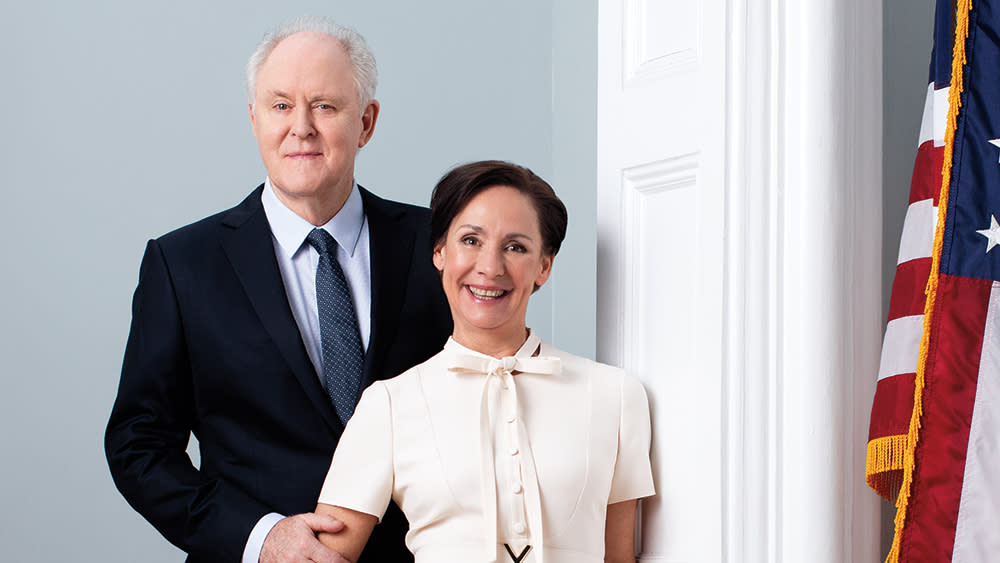
This season, Broadway’s wearing its politics on its sleeve.
Take a look at the new play starring Laurie Metcalf and John Lithgow. In many ways, the characters they portray could be anyone — just two people in a hotel room late at night, navigating a turbulent, high-stakes time in their marriage.
Related stories
Sundance Film Review: 'The Tomorrow Man'
John Lithgow-Blythe Danner's 'Tomorrow Man' Bought Ahead of Sundance Premiere
Laurie Metcalf, John Lithgow to Star in 'Hillary and Clinton' on Broadway
But they’re not just anyone, because the characters played by these two Tony-winning actors are named Hillary and Bill Clinton.
The latest Broadway outing for playwright Lucas Hnath (“A Doll’s House, Part 2”), “Hillary and Clinton” isn’t alone. It’s one of several plays this season that directly, often urgently, address the contemporary political landscape.
Some, like “Hillary and Clinton” or “What the Constitution Means to Me,” Heidi Schreck’s deft mashup of personal memoir and constitutional debate, do it overtly. Others, such as “Gary: A Sequel to Titus Andronicus,” take a sideways approach; the Taylor Mac comedy is framed as the aftermath of a Shakespearean tragedy but draws clear inspiration from more recent news cycles.
Politics has always played a role on Broadway. The international mega-smash “Hamilton,” for instance, not only chronicles the birth of the nation, but by casting nonwhite actors as the Founding Fathers, it engages directly with an ongoing cultural conversation about diversity and inclusion — issues whose rise in prominence contributed to the 2018 midterm surge in female and nonwhite Congress members.
But right now, the sheer number of new plays that address vital political and social concerns makes this season feel like a rare moment of critical-mass topicality, especially for a slow-moving industry where the road to Broadway can take years.
Producers attribute the current crop of topical shows to a combination of artists responding to the world around them and the highly politicized climate in which seemingly everything feels more partisan than it might at another time.
“The job of theater is to be in conversation with the culture,” says Jordan Roth, the president of Jujamcyn Theaters and a lead producer behind last season’s Tony-winning, newly relevant Broadway revival of “Angels in America,” from playwright Tony Kushner. “And so if you didn’t see a lot of political work happening right now, that would be the unusual thing. This is the theater doing exactly what it’s supposed to do.”
Which raises the question: In one of the most contentious and divided eras in American history, does politics sell onstage? And if the traditional Broadway theatergoer skews older, wealthier and left-leaning, do these shows just preach to the choir?
At the very least, a lot of them have the potential to stir controversy. As a story about two of the country’s most divisive political figures, “Hillary and Clinton” could press a hot button or two.
“If the play is controversial, I would say it’s controversial just in the fact that it’s being done,” Lithgow says on a day off from rehearsals for the production, which begins Broadway previews March 16. “Because people reflexively think, ‘What are the real Bill and Hillary going to think about this play?’”
Metcalf adds, “If I watched it, I think I would be shocked in places. It’s a comedy with chasms.”
The Clintons have maintained radio silence on what they think of the project and whether they plan to see it. (Reps for both Clintons declined repeated requests for comment.) Regardless, the family — all regular theatergoers, especially Hillary — will probably catch a Broadway production sometime soon, and given the current slate, they’re likely to find themselves at a show that wrestles with the complicated, factious arena they know so well.
Broadway itself can be seen as a politically significant platform, according to Kerry Washington, who starred in and co-produced “American Son,” a ground-level depiction of gun violence and police brutality that finished a 16-week run in January. “I felt like I needed to do the play for all of the kids and the young men and women we have lost to police violence, and the men and women who live in fear of these kinds of confrontations, and their families,” she says. “And to have that conversation, this exploration of the modern-day concerns of parenting a black child, in the most sanctified space of theater in this country — to have the names Tamir Rice, Philando Castile and Eric Garner repeated in the hallowed halls of Broadway, and be honored in this canon — was meaningful.”
From a fiscal perspective, political content isn’t a kiss of death, but it isn’t a slam-dunk either.
“American Son,” for instance, lost money in its Broadway run — but the issues at its core have help spur interest in the play from regional theaters as well as from Netflix, which is producing a film adaptation with Washington’s Simpson Street. Meanwhile, “The Lifespan of a Fact,” the play about journalism and artistic license that indirectly but strikingly addressed the fake news phenomenon (with Daniel Radcliffe and Bobby Cannavale in lead roles), recouped its reported $4.1 million capitalization well before it ended its limited run in January.
With annual sales approaching $2 billion and an overall attendance of 14.4 million last year, Broadway is the highest-profile outpost of the theater industry in the country. It’s also an expensive place to put on a show, and in order to make a buck, producers must ensure a production draws a crowd well beyond the relatively small demographic of regular playgoers and theater fans.
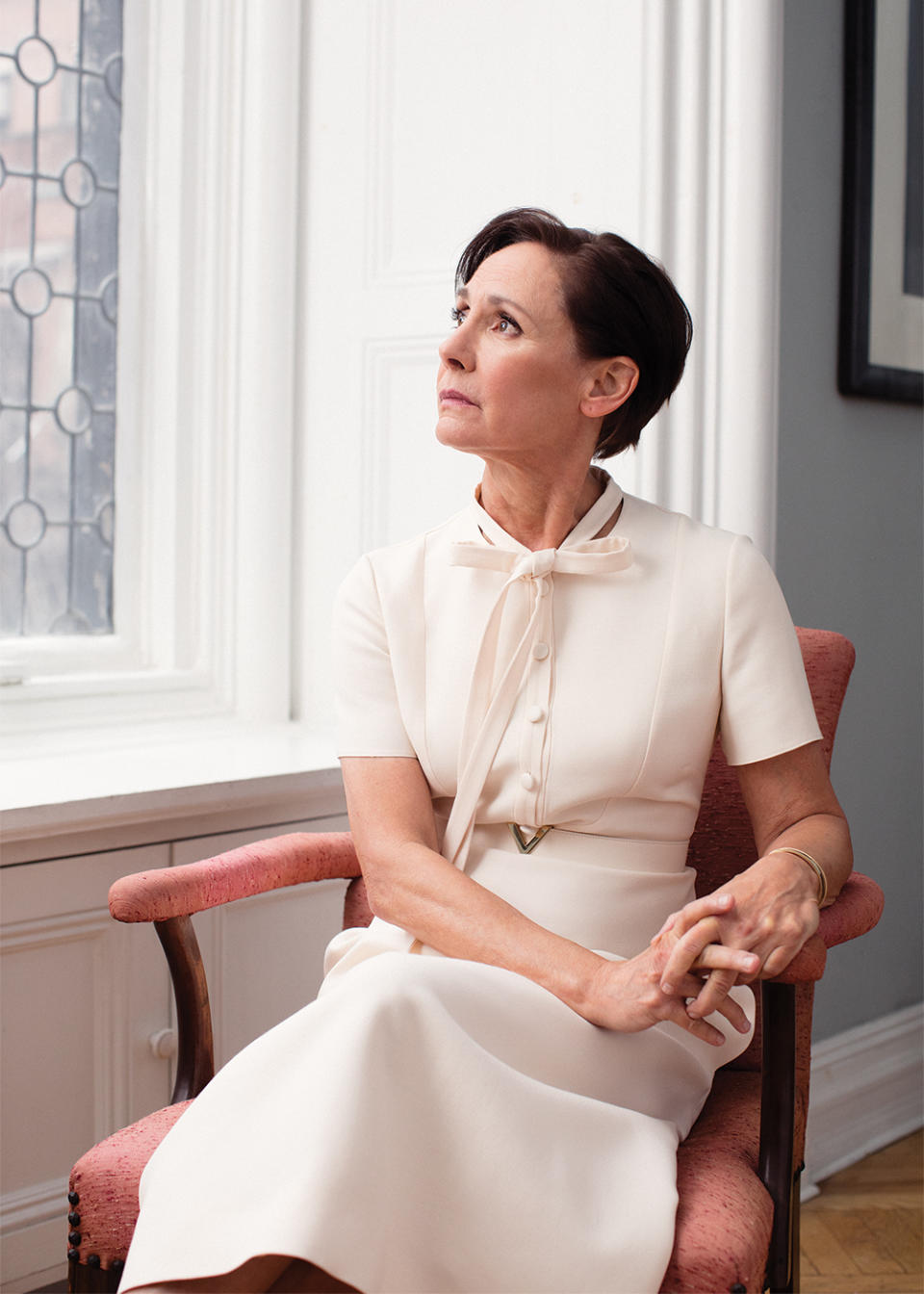
In general, producers don’t consider politics to be any riskier than any other subject matter on the Broadway landscape, where only one in five productions recoups.
“Political themes figure into our thinking about whether to produce a play only insofar as they interest us, and they do,” says Scott Rudin, the busy producer (“The Book of Mormon,” “Hello, Dolly!”) behind “Hillary and Clinton,” “Gary” and the new hot-ticket adaptation of “To Kill a Mockingbird.” “We only ever think about what we think can be good. Everything else is secondary. But a lot of issues go into the definition of ‘good,’ and politics might well be one of them.”
Rudin calls this a great time for plays in general and “a golden age for American playwriting,” and notes, “Political unrest always produces smart dissent — and a lot of great plays are born out of dissent.”
Politics can attract star actors to a project, but it’s only one of many considerations for performers, according to Bryan Cranston, the box office draw now starring in “Network.” That show arrives in New York at a time when its 1970s satire of broadcast news plays more like a dark exposé of how the media exploits and manipulates politics. “I choose projects based on what resonates with me,” the actor explains. “A good story. Often it involves a myriad of politics, but not always in the literal sense. In addition to governmental politics, there is business, social, sexual, emotional politics, among many others.”
In some cases, timely themes can prove to be a marketing boon, driving up interest from consumers and press alike. “What the Constitution Means to Me,” for example, has sparked a flurry of media coverage, including a lengthy story in The New Yorker, thanks to its boundary-pushing mix of personal storytelling and incisive constitutional analysis.
“I don’t think about selling a show as ‘political’ or ‘good for you’; I think you sell a show as a great story, a great experience and great performances,” says “Network” producer David Binder. “If journalists want to write about those political ideas, or if there’s editorial about that, great. But we don’t lead with it.”
The potential to draw a wide audience was one reason producers pushed “What the Constitution Means to Me” to Broadway. At first blush, the unconventional show, conceived at small nonprofit theaters, doesn’t seem a natural candidate for a transfer, but the popularity of an extended Off Broadway run convinced backers to give it a shot.
“It was the continuing momentum and enthusiasm around the show that really led us to bring the show to Broadway,” says Matt Ross, a lead producer of “Constitution” along with Diana DiMenna and Aaron Glick. “It became clear that the show was resonating well beyond theater audiences, and that confirmed to us that it could have a life on Broadway.”
Artists agree that robust political dialogue is only to be expected from creators whose job has always been to engage with the deepest currents at work in our country.
“I don’t think of myself as a political artist,” says Mac, the MacArthur grant recipient (“A 24-Decade History of Popular Music”) who wrote “Gary.” “But I’m someone who pays attention to the world, and I suppose I use art as a way to grapple with the complexity of ideas and circumstances, in terms of what’s happening politically. That’s always part of it.”
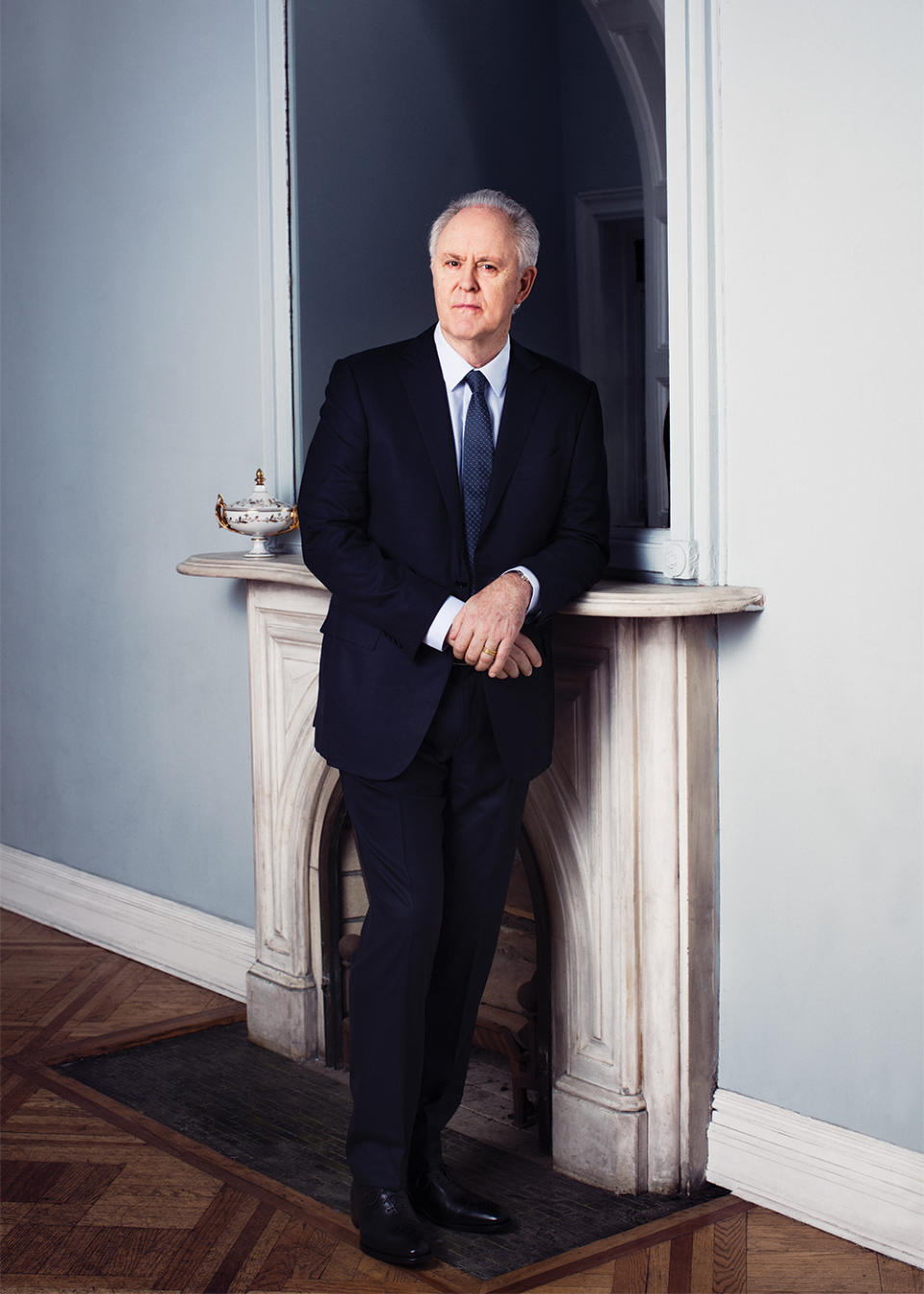
Schreck, who had the idea for “Constitution” 20 years ago and started work on it a decade later, notes, “Theater is not great at punditry. We’re not quick responders. It’s not how the form works in any way. But as playwrights, we were obviously engaging in things that were simmering under the optimistic veneer of this country during the Obama presidency, the way a lot of political activists were engaged with the things underneath. So it makes sense that these things are surfacing now.”
In the case of “Hillary and Clinton,” Hnath was inspired to write the play while watching C-SPAN during the 2008 presidential primaries. The show is set during that time, in what the creatives refer to as an “alternate universe.”
But the play nonetheless carries plenty of resonance for the current tempestuous state of the nation. That’s by design. The playwright says he significantly rewrote “Hillary and Clinton” following its first productions in 2016, with the aim of getting at what he sees as the central tension in contemporary politics.
“Hillary’s loss in 2016 was inarguably more profound than when she lost the primary in 2008, and it raised a big question of ‘How did we get here?’” Hnath says. “There was a chance to think about the real problem, the divide between acting on emotion and acting on reason. There’s a line now in the play that’s something like ‘Voting is never not emotional.’ I think that’s true, and I think it’s unavoidable, but I also think it’s very dangerous.”
He doesn’t yet know how a Broadway audience will react to the work, the characters it depicts and the issues it plumbs. “In rehearsals we might sometimes be forgetting that there are parts of this play that are going to get a very loud reaction,” he says. “It’s voicing some things that maybe people have been feeling, and to be able to say it in a big room with people gathered together in the same space, it might create a kind of conversation.”
For Lithgow, the play reveals the humanity behind the talking heads. “There are scenes where we angrily, angrily argue certain political points, and those scenes are so charged with our own personal feelings for each other,” he says. “It’s fascinating stuff.”
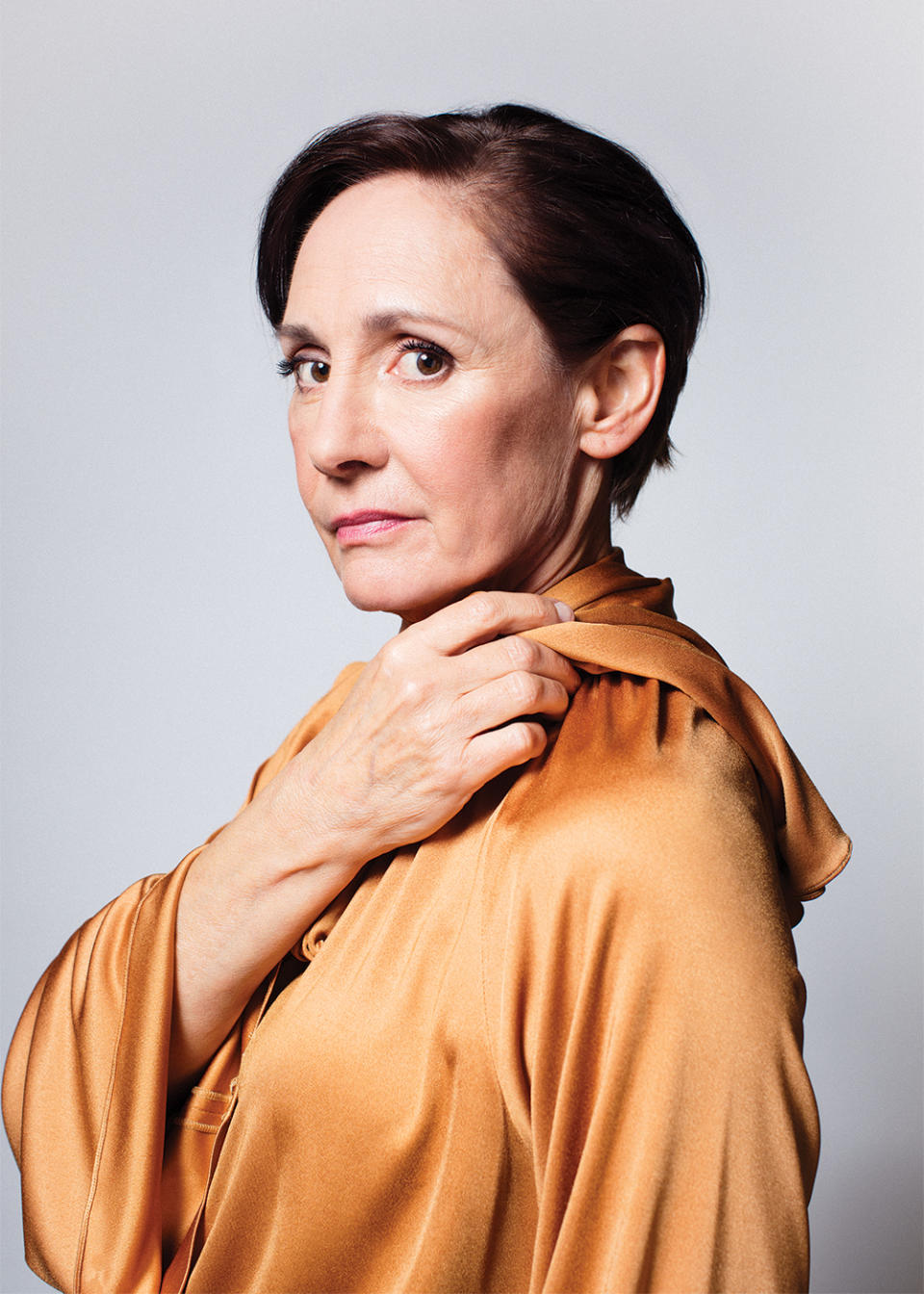
“Hillary and Clinton” also finds itself in conversation with all the events that have happened since the 2008 primaries. “There are a few lines at the end of the play that are haunting to me, because we’ve seen the 10 years that these characters have not seen yet,” Metcalf says. “It makes them seem vulnerable, because we know what they don’t know.”
Broadway usually leans left. That’s equally true onstage — stretching back to “The Cradle Will Rock,” the 1937 musical that was shut down by the WPA for being too radical — and offstage, where in recent years Broadway producers have organized fundraisers for Obama and Hillary Clinton.
In November 2016, when Mike Pence, then the Republican vice president elect, showed up at “Hamilton,” the audience booed and the cast addressed him in a curtain speech. Stars from Broadway and Hollywood spoke at a protest that occurred the night before Trump’s inauguration, and the next day, a group of theater industry favorites debuted the Concert for America series held in response to the Trump administration and its policies. In September 2018, an audience member flaunting a “Make America Great Again” flag at “Frozen” had it snatched away by an actor taking his bow.
There’s little firm research about the political proclivities of the traditional Broadway audience, but anecdotal evidence suggests it’s a largely liberal crowd. Despite that, artists and producers aren’t concerned that their shows might only play to audiences that have the same viewpoints, because all of them will tell you their projects aim to raise questions, not proscribe solutions.
“I made the intentional decision to end the play with a debate,” Schreck says of “Constitution.” “There’s no point in the play when I’m saying, ‘This is what I believe, and this is what you should believe too.’ I’m saying, ‘These are the questions I have; here are the opposing viewpoints. How do we connect in the midst of all this disagreement?’”
Among all these concerns, there’s one element that playwrights and other creatives can’t control: the news of the day and all the headlines an audience carries in with it when a show hits the stage after years of development. For some titles, a fluke of timing can bump up the resonance.
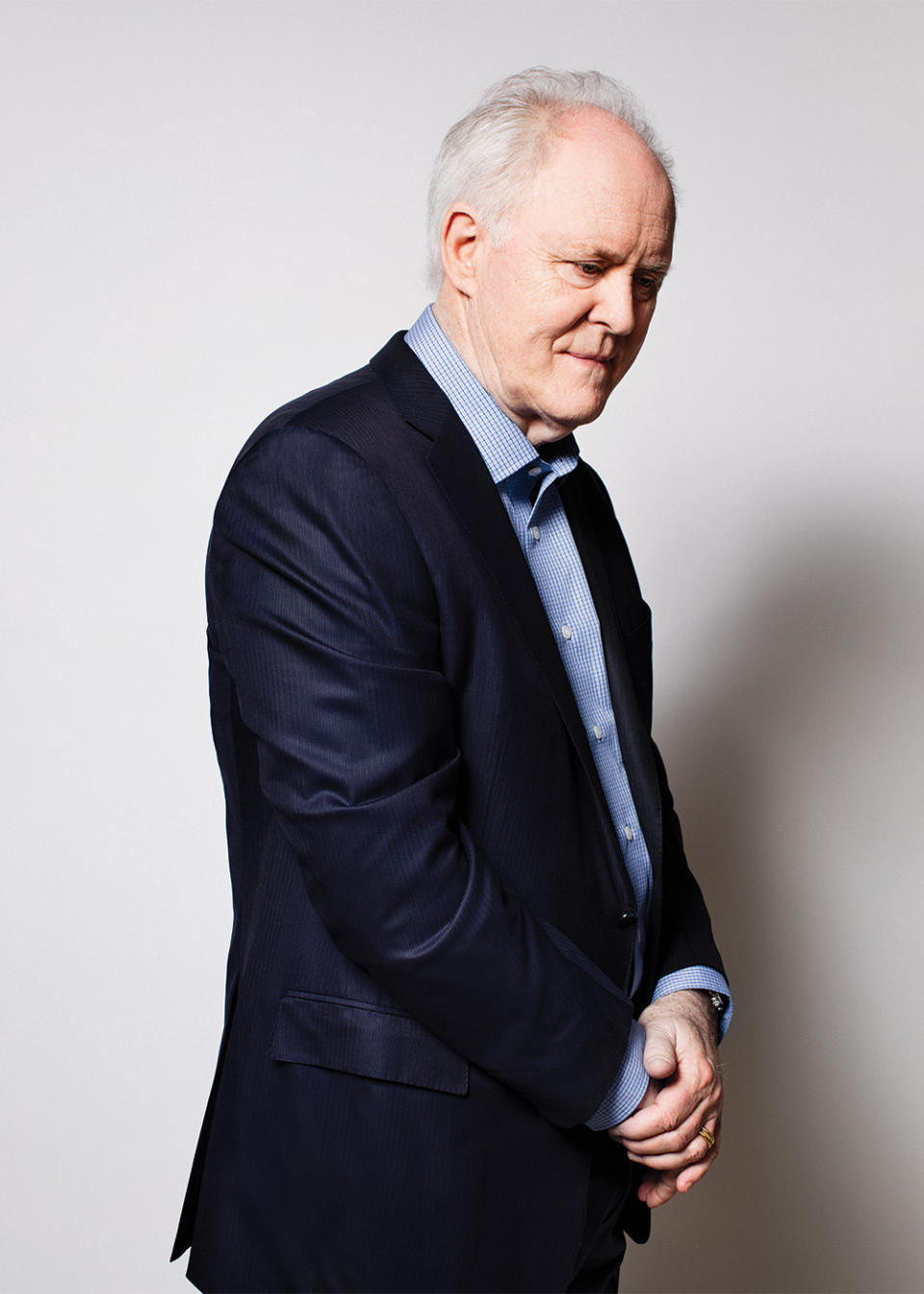
“If ‘The Lifespan of a Fact’ had come out 10 years ago, maybe people wouldn’t even be talking about it as a political play,” suggests Radcliffe of his recent Broadway outing, which centered on the conflict between a journalist and a fact-checker. “These days, you can’t mention facts without it being a political statement.”
Metcalf believes a production she starred in a decade ago — “November,” David Mamet’s 2008 comedy about a buffoonish president — would land very differently today. “People saw that play as an out-and-out farce at the time, but I keep imagining a production of it now,” the actress says. “It would certainly hit closer to home, and I don’t know how the humor would come across. I think it would be a scarier show to sit through.”
Metcalf appeared in “November” opposite Nathan Lane, who’s playing the title character in “Gary.” According to Lane, the latter show finds timeliness in a timeless story that chimes with today’s world without directly replicating it.
“This is a way of talking about what’s going on now without having a guy in orange makeup and a long red tie,” Lane says. “How do we wind up in these kinds of circumstances? If we’re not paying attention, history does keep repeating itself. How do we break that cycle?”
As for whether theater can change people’s minds, it depends on whom you ask. Lithgow believes “Hillary and Clinton” won’t necessarily shift a viewer’s political opinions; instead it goes for something deeper.
“We’re all living with this terrible anxiety and sadness — at least those of us who are not delighted by what’s happening in politics — and the play internalizes that and makes use of that,” he says. “It’s a very moving play, in ways that you don’t expect.”
For many other artists and producers, theater is uniquely suited to making people think in new ways.
“Theater is the best place to talk about politics, because the theater is a place to explore ideas through the lens of character, of people with flaws and emotions and relationships,” Roth says. “Politics is not political theory. Politics is political theory as translated and lived and fought over by people.”
Sign up for Variety’s Newsletter. For the latest news, follow us on Facebook, Twitter, and Instagram.

